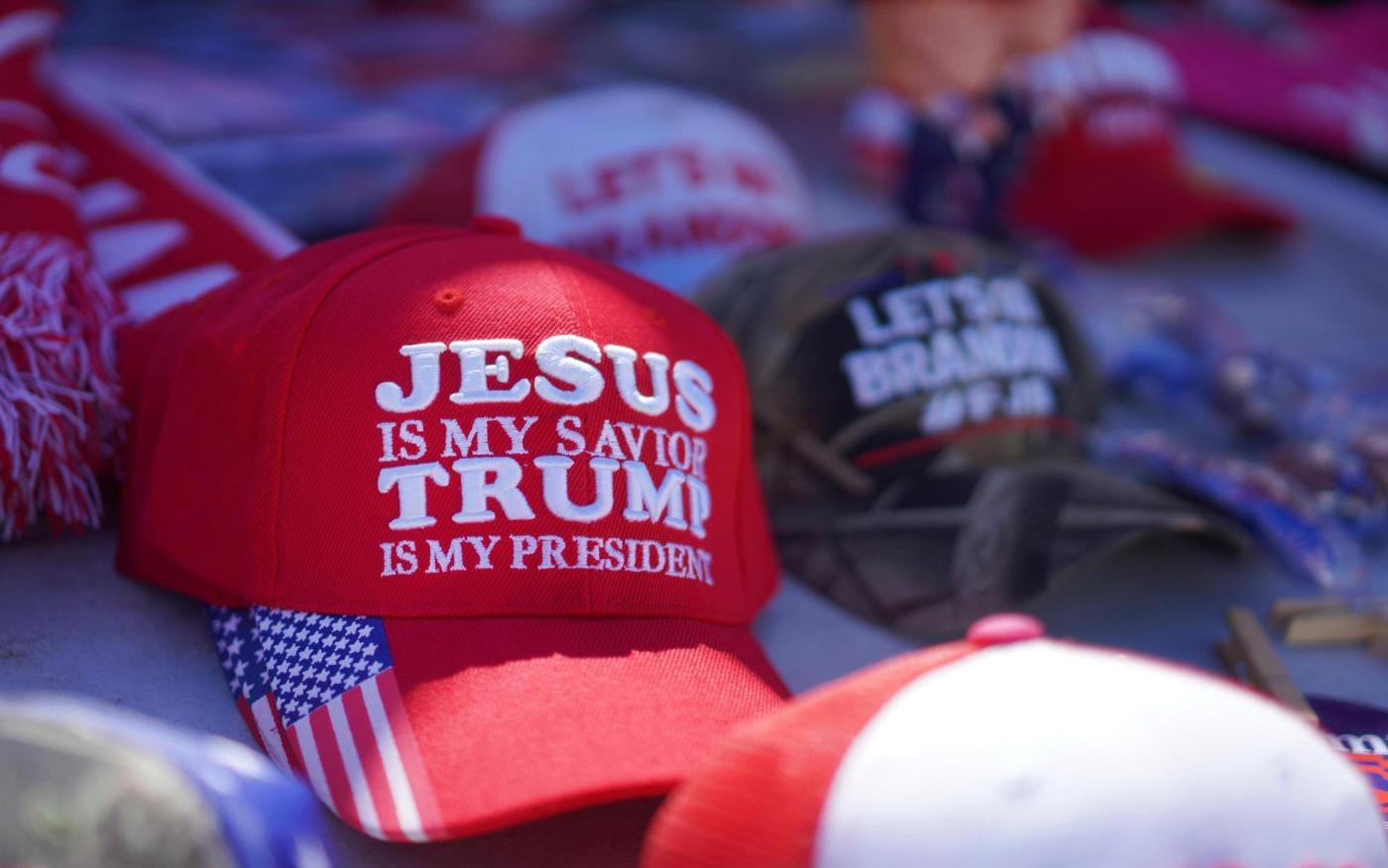Is God hiding in the market or is Politics hiding in god?
The evangelical speculative ethic is the new capitalist soundtrack
The last time a Republican won an outright majority in the US presidential election was 20 years ago. George W Bush’s victory was accompanied by reams of commentary about the role of the religious right. In retrospect, this was probably the peak of white-evangelical influence in US politics. Bush won with 78% of the evangelical vote, then a demographic group accounting for 23% of the population.
Trump won with around 80% of white evangelical support, now 20% of the population. A lot less is said about this now, with liberal concern - liberal hysteria - often turned elsewhere. Yes, some claim that Trump II will inaugurate a Christian-nationalist regime, but the emphasis is usually on the nationalism rather than the Christianity, the partial exception of the issue of abortion (but even here, liberals should worry less: when the people are allowed their say, they generally vote to liberalise abortion law. The road to restriction must therefore be anti-democratic; liberals should then focus on democracy rather than “defending the institutions”).
In fact, secular-liberal attention to the GOP’s evangelical support today tends to emphasise incoherence or hypocrisy, rather than ideological solidity: Trump is a socially liberal New Yorker and convicted felon. So how could the evangelicals support him? The facts bear out this intuition that it isn’t religious morality, traditionally understood, that is at issue. White evangelicals who almost never go to church support Trump in almost equal degree as regular churchgoers. And Pew Research reports that “white evangelicals (79%) say immigration will be very important in their voting decision – higher than any other group,” but abortion “is rated as a very important issue by more atheists (a group that mostly supports legal abortion) than by people with other religious identities.” Something else is going on.
In Compact,
asks: “How to account for the strange fact that Trump, lewd and the very opposite of Christian decency, can function as the chosen hero of the Christian conservatives?” Part of his answer is that Christians may be attracted precisely to Trump’s duality (lewdness + conservatism). But I don’t think answering this question can provide any guide to why Trump won – that has to be sought elsewhere (though it really isn’t a mystery at all; it’s rather self-evident and the reasons banal).Here are some general thoughts, which don’t exclude issues like immigration, the Democrats’ high-handed condescension and wokeness, the patent lies told over Biden and the process of his replacement, and Kamala Harris’ general shitness. But the economy, and inflation in particular, are central, and tie directly into the global anti-incumbency trend.
In thinking through Zizek’s question we can nevertheless glimpse something profound going on: Kamala’s pitch was ultimately post-political, whereas Trump stood for politics and political contestation. Kamala represented continuity with the End of History and the suppression of politics. For Zizek, via a reading of Boris Buden, religion as a political force is an effect of the post-political disintegration of society. But this isn’t (just) a question of religion playing a role in politics; it is that religious fundamentalism acts as a space for antagonistic passions, and thus is a vehicle for the return of politics.
Again, this does not serve as a particularly good explanation for why Trump won, but it does alert us again to the consequences of the repression of politics, of antagonism, of passion. The culture wars 2.0 act as an imperfect site for these desires to play out.
As such, we secular auflkärer might have to reckon with an inversion of the trend expressed throughout modernity: that political theology is now fully secular in its inspiration, but religious in its function. Previously, the commandment that you cannot (lest you transgress) had religious dressing, even if its ends were secular. Secular utopian strivings were against God. Don’t glance at that red flag, look up to the Cross. Individual liberty has to be constrained in the name of religious morality (but in the service of an ungodly capitalist social order).
What if today the yearning for something more is advanced by fundamentalist religion, or even by millenarian populism? And the always-depoliticising argument that “you shouldn’t dream of bigger things” because “it’s impossible” is put forth in exclusively secular terms? You cannot, because market. Because the institutions. Because planetary limits.
Let’s rewind to a moment that saw the confounding of a secular utopia (possibly one of the last ones halfway worth the name).
In the early 1960s, Brazil built and inaugurated a new, modernist capital, Brasília, on a plateau nearly 1000km inland of the old capital, Rio de Janeiro. The country was undergoing industrialisation and urbanisation at a blistering pace, and the working class’s share of income was rising. “Centuries ago, cities were built where men decided to stop. Today, man decides where he wants to build,” a government brochure declared. Pointedly, the New Yorker’s story on this “fitting symbol of the country’s future” was entitled “Man Decides Where.”
Yet, this modernist notion that humanity is sovereign was soon to encounter a deadening political theology. First, the coup of 1964 and ensuing 21-year military dictatorship pursued “authoritarian modernisation” of widespread repression and curtailment of popular autonomy. The coup was immediately preceded and accompanied by demonstrations under the banner Marcha da Família com Deus pela Liberdade (March of the Family with God for Liberty). Popular reforms became the object of murderous Cold War anti-communism, which leveraged religious traditionalism as an ideological handmaiden to the tanks on the streets – the Brazilian story isn’t atypical if you know the general history.
Then, the 1980s debt and inflation crises opened the door to neoliberal counter-reforms, now under civilian government, and soon after under democratically elected civilian government in the 90s. In the weft of counter-reforms, the goal of economic development and national autonomy were finally abandoned. This dispensation – the limited horizons of neoliberal democracy – was then confirmed under the “Lulista pact” of the 2000s, according to which mild redistribution and inclusion in the consumer society was the best that could be hoped for.
By this point, the political theologies of the day were entirely secular. “You can’t because globalisation.” But the opposition that emerged to put an end to 13 years and a half years of Workers Party government wasn’t secular. In fact, during Presidents Lula and Dilma’s periods in office, Brazil underwent an epochal religious transition, with the number of Catholics falling, and evangelicals rising, by 1% per year. This is still ongoing, such that, by 2032 evangelicals will become a plurality (about 40% of the population), putting an end to Brazil’s position as the largest Catholic country in the world.
In 2018 and 2022, Bolsonaro won 70% of the evangelical vote. When the generals took over in the 1960s, ufanismo – excessive pride in the national self – was mobilised by the regime as a way of shutting down any critical or utopian perspectives. In the postmodern nationalism known as Bolsonarismo – one which borrows so much from Trump that it cannot be accused of ufanismo but rather of viralatismo (mongrel-ism, a collective inferiority complex which results in seeing anything foreign or imported as ipso facto better than what’s homegrown) – Brazil isn’t the greatest. Instead, Brazil’s problems are recognised, but progress as traditionally understood is blocked; it not possible. Instead, “corruption” – everything ranging from violence, crime, drugs, social progressivism and cultural liberalism – must be eradicated, and done so, in extremis, through holy war.
I cite the great Brazilian philosopher Paulo Arantes in my piece who, in similar lines to Zizek, notes that the age of TINA is over. Yes, there is now an alternative to neoliberal democracy, but it is an apocalyptic one.
I have a new essay out in Aeon in which I put this social transformation up against Brazil’s history of utopianism, and ask what it signifies. Evangelicals are self-starting, self-organised, democratic proletarians. They are also socially conservative authoritarian followers. They are anti-political sectarian radicals who refuse to adapt to the modern world. They are also money-obsessed conformists who know the price of everything and the value of nothing.
What is the truth of the matter? I suspect, given charismatic Christianity’s spread amongst the world’s poor, the answer matters a great deal. And though I won’t abandon any secular-enlightenment principles, I do think we need to let go of conceptions inherited from the 20th century, to understand where utopian strivings and political theologies actually lie.







![Cartaz “Queremos governo cristão” na Marcha da Família com Deus pela Liberdade. (Créditos: FGV CPDOC)[1] Cartaz “Queremos governo cristão” na Marcha da Família com Deus pela Liberdade. (Créditos: FGV CPDOC)[1]](https://substackcdn.com/image/fetch/$s_!HIM-!,w_1456,c_limit,f_auto,q_auto:good,fl_progressive:steep/https%3A%2F%2Fsubstack-post-media.s3.amazonaws.com%2Fpublic%2Fimages%2F59862840-bc88-4bec-986f-dcd34cd3e1f1_600x406.jpeg)
